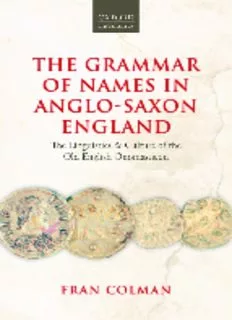
The grammar of names in Anglo-Saxon England : the linguistics and culture of the Old English onomasticon PDF
Preview The grammar of names in Anglo-Saxon England : the linguistics and culture of the Old English onomasticon
The Grammar of Names in Anglo-Saxon England The Grammar of Names in Anglo-Saxon England The Linguistics and Culture of the Old English Onomasticon FRAN COLMAN 1 3 GreatClarendonStreet,Oxford,ox26dp, UnitedKingdom OxfordUniversityPressisadepartmentoftheUniversityofOxford. ItfurtherstheUniversity’sobjectiveofexcellenceinresearch,scholarship, andeducationbypublishingworldwide.Oxfordisaregisteredtrademarkof OxfordUniversityPressintheUKandincertainothercountries #FranColman2014 Themoralrightsoftheauthorhavebeenasserted FirstEditionpublishedin2014 Impression:1 Allrightsreserved.Nopartofthispublicationmaybereproduced,storedin aretrievalsystem,ortransmitted,inanyformorbyanymeans,withoutthe priorpermissioninwritingofOxfordUniversityPress,orasexpresslypermitted bylaw,bylicence,orundertermsagreedwiththeappropriatereprographics rightsorganization.Enquiriesconcerningreproductionoutsidethescopeofthe aboveshouldbesenttotheRightsDepartment,OxfordUniversityPress,atthe addressabove Youmustnotcirculatethisworkinanyotherform andyoumustimposethissameconditiononanyacquirer PublishedintheUnitedStatesofAmericabyOxfordUniversityPress 198MadisonAvenue,NewYork,NY10016,UnitedStatesofAmerica BritishLibraryCataloguinginPublicationData Dataavailable LibraryofCongressControlNumber:2013956027 ISBN 978–0–19–870167–5 Printedandboundby CPIGroup(UK)Ltd,Croydon,CR04YY LinkstothirdpartywebsitesareprovidedbyOxfordingoodfaithand forinformationonly.Oxforddisclaimsanyresponsibilityforthematerials containedinanythirdpartywebsitereferencedinthiswork. An Onomasticonfor Γιωάννη Contents Preface ix ConventionsandAbbreviations xi 1. Introduction 1 1.1 Ontheonomasticon 1 1.2 Notesonthesources 9 1.3 Genderandthenamedata 10 Part I. On names 2. Namesaswords 21 2.1 Onthe(non-)distinctivenessofOldEnglishpersonalnames 21 2.2 Namesasnouns? 28 2.3 Onfunctionsofnames 30 3. Namesarenotnouns 50 3.1 Namesasdeterminerphrases? 50 3.2 Namesandnotionalgrammar 52 3.3 Lexicalversusfunctionalcategories 56 3.4 Prototypicalityandsecondarycategories 62 3.5 Referentialityandsecondarycategories 69 3.6 Conversion 74 3.7 Ellipsis 78 4. Anameisaname 80 4.1 Namesandfixedreference/identification 80 4.2 Theonomasticonandthegenerallexicon 83 4.3 Namesanddictionaries 90 4.4 ConclusiontoPartI 94 Part II. Towards the Old English onomasticon 5. OldEnglishpersonalnameformation 101 5.1 Selectionofnameelements 101 5.2 Combinationofnameelements 105 5.3 On‘intelligibility’ofOldEnglish‘compound’names 118 5.4 OriginsofOldEnglishmonothematicnameformation 125 viii Contents 6. Generallexicalformation 151 6.1 Lexicalformationandidioms 151 6.2 Lexicalformation:derivationalmorphology 158 6.3 Morphologyandthegrammar 169 6.4 ‘Complex’versus‘compound’commonwords 175 6.5 OldEnglishlexicalstressassignment 183 6.6 Conclusiontogenerallexicalformation 189 7. StructuresofOldEnglishpersonalnames 190 7.1 ‘Complex’versus‘compound’OldEnglishnames? 190 7.2 DithematicnamesandtheOldEnglishonomasticon 196 7.3 Reductionofdithematicnames 198 7.4 Neutralization 208 7.5 ConclusiontoChapter7 219 8. Ontheroleoftheparadigmasamarkeroflexical-itemformation 220 8.1 Introduction:theOldEnglishweaksuffix<a> 220 8.2 The‘weakending’anditsorigins 223 8.3 Germanicweakadjectivedeclension 235 8.4 OldEnglishn-stemmonothematicpersonalnames (or:the<a>suffixonnames) 247 8.5 Onso-called‘proprialeMarkierung’asderivationalmorphology 262 8.6 Conclusion 268 9. AnOldEnglishonomasticon 270 9.1 Elementsindithematicnames 270 9.2 Monothematicnames 270 9.3 Othernicknames 271 9.4 Conclusion 273 9.5 Asampleonomasticonanditsactivation 274 References 277 IndexofAuthors 293 IndexofPersonalNames 297 IndexofSubjects 302 Preface In the mid 1970s, in Oxford, I treated myself to a pair of sheepskin slippers. Partly because I was freezing. But also because they came in a shoe box of proportions appropriate to store the annotated index cards of coin spellings brought in elastic- banded bundles from Sydney, where, in the Department of English Language and Mediaeval Literature, Professor H. L. Rogers had instigated my research for a post- graduate thesis on philological analyses of the spellings on the eighth- and ninth- centurycoinsinthesecondSyllogeofCoinsoftheBritishIslescontainingAnglo-Saxon coins. The acquisition of somewhat more enticing shoes continued, as data were expanded,andmyattentionwasturnedtothelateAnglo-Saxonperiod. During thesubsequentdecades,myresearch,publications,andlectures—bothas partofajob,andasinvitedturnsthroughoutEuropeandbeyond—onallaspectsof English grammar and its history, served to inform my linguistic analyses of coin spellingsandothernamedata,andtoconfirmtheconvictiononwhichthisbookis grounded. That is, that the linguistic study of names is not isolated: not from the grammarasawhole,nor,evenless controversially,fromwhatcanbeknownabout thehistoryofthepeoplewhouseorusedthatgrammar.Ahistoricalstudyofnames dependsalsoonstudiesofthematerialsonwhich,methodsbywhich,andreasonsfor which,linguisticmaterialofthepastwasrecorded. If the following observation of Stenton (1970 [1924]: 168) refers to grammatical classification,thenforonceImustdisagreewithitsauthor.‘Noattempttointroduce classification into a subject so intimately connected with human life as personal nomenclature can be other than arbitrary.’ Names and naming are central to language. Language is ‘intimately connected with human life’, yet it is subject to non-arbitrary classification. Naming is anthropocentric. People name first people, thenplacesandotherthingsandeventsofsignificancetopeople.Andthishierarchy pervadeslanguageingeneral.Notionalgrammar,especially,embodiesananthropo- centricviewoflanguage.Thelinguisticstudyofnamesrespondstonotionalanalysis, which confirms the status of names as a grammatical category, specifying in what ways names, as even more ‘intimately connected with human life’ than the rest of language, differ from common words. The Grammar of Names in Anglo-Saxon Englandputsnotionalgrammartoworkonabodyofhistoricalmaterial,providing precise descriptions, in dependency formulations, of, for instance, several hitherto vaguelydelineatedpuzzlesofIndo-EuropeanandGermanicphilology. Thisbookisapartialproductofmyreturntospecificallyearlycoinmaterial,onthe award of a Senior Research Fellowship from the British Academy and Leverhulme Trust,duringtheacademicyearof2001–2.Mygratitudeforthis,andtoDrKenEmond
